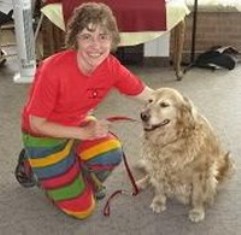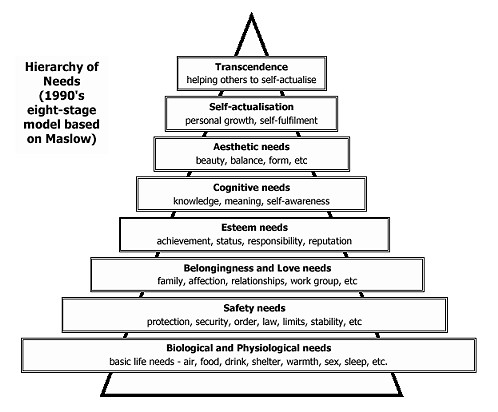Self-Help, To My Mind, Has Gotten A Bad Rap

The term self-help (S.H.) normally refers to any case or practice whereby an individual or a group attempts self-guided improvement – physically, socially, emotionally, spiritually, economically, or intellectually, or emotionally. (The link is to "50 self-help classics: 50 inspirational books to transform your life by Tom Butler-Bowdon.)
S.H., to my mind, has gotten a bad rap as being akin to selfishness. Me, I favour Abraham Maslow’s understanding of self-help – which is in order to “self-actualize” – to become all we are meant to be – we need to have certain needs met.
Thus the understanding of this S.H. section is that when we have achieved some degree of wellness ourselves, we can work with others to help in their healing. In helping ourselves, we help ourselves – provide self-help!
The pictoral theme of this section is animals (including human animals) helping each other.
S.H., to my mind, has gotten a bad rap as being akin to selfishness. Me, I favour Abraham Maslow’s understanding of self-help – which is in order to “self-actualize” – to become all we are meant to be – we need to have certain needs met.
Thus the understanding of this S.H. section is that when we have achieved some degree of wellness ourselves, we can work with others to help in their healing. In helping ourselves, we help ourselves – provide self-help!
The pictoral theme of this section is animals (including human animals) helping each other.
Accountability Partner
I encourage you to get an accountability partner (also known as a friend) and do all of these S. H. exercises systematically - one per week. By the end of one week you will have had the equivalent of nine to ten sessions of counseling. At a rate of, let's say, $75 per hour times two people, you've just saved yourselves $1500.00!
I feel very strongly that any person who embarks on becoming a counselor needs to have in-depth counseling over a period of time in order to discover and incorporate her or his dimples and warts.
And I maintain that counselors should see a counselor at least twice a year - usually more. By doing this they we will not be as tempted to bring our own problems and resolutions into the counseling appointments of others.
I feel very strongly that any person who embarks on becoming a counselor needs to have in-depth counseling over a period of time in order to discover and incorporate her or his dimples and warts.
And I maintain that counselors should see a counselor at least twice a year - usually more. By doing this they we will not be as tempted to bring our own problems and resolutions into the counseling appointments of others.
Techniques and Exercises
Here is a list of S.H. techniques and exercises many have found helpful. I hope you do too. You will find them all on the navbars to the left.
1. Journaling
2. Mood-Mapping with a week-long time sheet
3. Whole Health Check In – physical, social, emotional, spiritual, intellectual, vocational
4. Socio-Economic Well Being Inventory
5. Knowing Your Community Resources including Recreational Activities
6. “Ten Things I Like About Me”
7. Challenging The Lies We Tell Ourselves (and others may too!)
8. Goal-Setting and Achievement – where do we really want to go?
9. Finding "The Why" in Order to Bear "The How"
10. How to Be the Happiest, Healthiest Person You Can Be!
1. Journaling
2. Mood-Mapping with a week-long time sheet
3. Whole Health Check In – physical, social, emotional, spiritual, intellectual, vocational
4. Socio-Economic Well Being Inventory
5. Knowing Your Community Resources including Recreational Activities
6. “Ten Things I Like About Me”
7. Challenging The Lies We Tell Ourselves (and others may too!)
8. Goal-Setting and Achievement – where do we really want to go?
9. Finding "The Why" in Order to Bear "The How"
10. How to Be the Happiest, Healthiest Person You Can Be!
Maslow’s Hierarchy of Needs
– from “Psychology - The Search for Understanding” by Janet A. Simons, Donald B. Irwin and Beverly A. Drinnien
Maslow has set up a hierarchy of five levels of basic needs. Beyond these needs, higher levels of needs exist. These include needs for understanding, esthetic appreciation and purely spiritual needs. In the levels of the five basic needs, the person does not feel the second need until the demands of the first have been satisfied, nor the third until the second has been satisfied, and so on. Maslow's basic needs are as follows: physiological, safety, belongingness, esteem and self-actualization.
1. Physiological Needs
These are biological needs. They consist of needs for oxygen, food, water, and a relatively constant body temperature. They are the strongest needs because if a person were deprived of all needs, the physiological ones would come first in the person's search for satisfaction.
2. Safety Needs
When all physiological needs are satisfied and are no longer controlling thoughts and behaviors, the needs for security can become active. Adults have little awareness of their security needs except in times of emergency or periods of disorganization in the social structure (such as widespread rioting). Children often display the signs of insecurity and the need to be safe.
3. Needs of Love, Affection and Belongingness
When the needs for safety and for physiological well-being are satisfied, the next class of needs for love, affection and belongingness can emerge. Maslow states that people seek to overcome feelings of loneliness and alienation. This involves both giving and receiving love, affection and the sense of belonging.
4. Needs for Esteem
When the first three classes of needs are satisfied, the needs for esteem can become dominant. These involve needs for both self-esteem and for the esteem a person gets from others. Humans have a need for a stable, firmly based, high level of self-respect, and respect from others. When these needs are satisfied, the person feels self-confident and valuable as a person in the world. When these needs are frustrated, the person feels inferior, weak, helpless and worthless.
5. Needs for Self-Actualization
When all of the foregoing needs are satisfied, then and only then are the needs for self-actualization activated. Maslow describes self-actualization as a person's need to be and do that which the person was "born to do." "A musician must make music, an artist must paint, and a poet must write." These needs make themselves felt in signs of restlessness. The person feels on edge, tense, lacking something, in short, restless. If a person is hungry, unsafe, not loved or accepted, or lacking self-esteem, it is very easy to know what the person is restless about. It is not always clear what a person wants when there is a need for self-actualization.
Maslow has set up a hierarchy of five levels of basic needs. Beyond these needs, higher levels of needs exist. These include needs for understanding, esthetic appreciation and purely spiritual needs. In the levels of the five basic needs, the person does not feel the second need until the demands of the first have been satisfied, nor the third until the second has been satisfied, and so on. Maslow's basic needs are as follows: physiological, safety, belongingness, esteem and self-actualization.
1. Physiological Needs
These are biological needs. They consist of needs for oxygen, food, water, and a relatively constant body temperature. They are the strongest needs because if a person were deprived of all needs, the physiological ones would come first in the person's search for satisfaction.
2. Safety Needs
When all physiological needs are satisfied and are no longer controlling thoughts and behaviors, the needs for security can become active. Adults have little awareness of their security needs except in times of emergency or periods of disorganization in the social structure (such as widespread rioting). Children often display the signs of insecurity and the need to be safe.
3. Needs of Love, Affection and Belongingness
When the needs for safety and for physiological well-being are satisfied, the next class of needs for love, affection and belongingness can emerge. Maslow states that people seek to overcome feelings of loneliness and alienation. This involves both giving and receiving love, affection and the sense of belonging.
4. Needs for Esteem
When the first three classes of needs are satisfied, the needs for esteem can become dominant. These involve needs for both self-esteem and for the esteem a person gets from others. Humans have a need for a stable, firmly based, high level of self-respect, and respect from others. When these needs are satisfied, the person feels self-confident and valuable as a person in the world. When these needs are frustrated, the person feels inferior, weak, helpless and worthless.
5. Needs for Self-Actualization
When all of the foregoing needs are satisfied, then and only then are the needs for self-actualization activated. Maslow describes self-actualization as a person's need to be and do that which the person was "born to do." "A musician must make music, an artist must paint, and a poet must write." These needs make themselves felt in signs of restlessness. The person feels on edge, tense, lacking something, in short, restless. If a person is hungry, unsafe, not loved or accepted, or lacking self-esteem, it is very easy to know what the person is restless about. It is not always clear what a person wants when there is a need for self-actualization.
6. Need to Transcend the Self
Later in his life, Maslow came to decide self-actualization was not the highest level of development, and proposed that people who have reached self-actualization will sometimes experience a state he referred to as "transcendence," in which they become aware of not only their own fullest potential, but the fullest potential of human beings at large.
Later in his life, Maslow came to decide self-actualization was not the highest level of development, and proposed that people who have reached self-actualization will sometimes experience a state he referred to as "transcendence," in which they become aware of not only their own fullest potential, but the fullest potential of human beings at large.
Further Reading and Videos
Books
"The Third Force: The Psychology of Abraham Maslow" by Frank G Goble, 2004"
50 Self-Help Classics: 50 Inspirational Books to Transform Your Life, from Timeless Sages to Contemporary Gurus" by Tom Butler-Bowdon, 2003
Video
Maslow's Hierarchy by Camille
"The Third Force: The Psychology of Abraham Maslow" by Frank G Goble, 2004"
50 Self-Help Classics: 50 Inspirational Books to Transform Your Life, from Timeless Sages to Contemporary Gurus" by Tom Butler-Bowdon, 2003
Video
Maslow's Hierarchy by Camille
The purpose of life is not to be happy - but to matter, to be productive, to be useful, to have it make some difference that you have lived at all. - Leo Rosten

